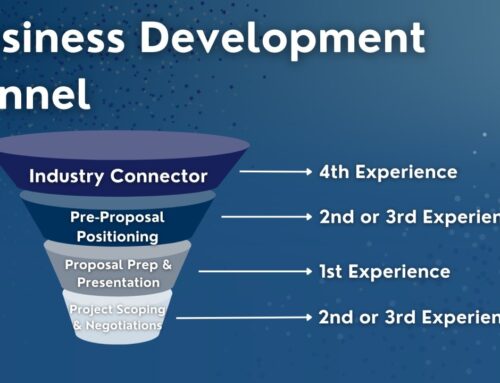
I have been doing a lot of reading lately – some of which, admittedly, is several years old – on the fact that there is a pending significant skilled worker shortage here in the U.S. No one dares write about this topic now, amidst high unemployment, but the current circumstances are merely distracting us from the truth: We in the U.S. are not producing the highly skilled workforce, in labor or the professional sciences, which can meet the demands of a normally functioning economy.
At this very moment, several industries are facing a dire skilled workforce shortage. These industries include healthcare, skilled manufacturing, and engineering. Yes, I said engineering. You and I both know that this is a very broad brush stroke, but that’s beside the point. I can tell you that, in my own experience and from speaking with many collaborators, there is a supply void for engineers in all facets of mass transit, water resources, and energy/renewables/sustainability (According to Manpower’s 2009 Talent Shortage Report , only 19% of companies indicated that they had trouble filling positions in 2009. The #1 recruiting trouble spot? Engineers). When it comes to infrastructure, there may be a good supply of engineers who know how things have been done, but there is a shortage of those who can meaningfully contribute to the way we will move, drink, power up and live in the 21st century. To paraphrase a now defunct automaker, this is not your father’s infrastructure.
 Not everyone agrees with the panicky warnings of the skilled worker gap, but all agree that the skills needed to meet the challenges of a modern market are different from those of the past, therefore creating great challenges in certain niches – even amidst “The Great Recession.”
Not everyone agrees with the panicky warnings of the skilled worker gap, but all agree that the skills needed to meet the challenges of a modern market are different from those of the past, therefore creating great challenges in certain niches – even amidst “The Great Recession.”
Here are some of the trends which are said to predicate a massive skilled worker shortage within the next five to ten years:
- Demographics. Baby Boomers are making up a large number of the senior ranks right now, and although they don’t seem to be going anywhere at this moment, when they do decide to stop working, there are fewer workers in the generation succeeding them to fill their shoes. Apparently, the boomers were so busy working and enjoying their relative wealth, they didn’t see fit to make a lot of babies (also an issue in funding social security). So, in summary, you have people leaving the workforce in greater number than the U.S. has replacements for them. This part of the crisis doesn’t even require job growth, since it is all about maintenance of productivity.
- And speaking of productivity, I have something to share which will be mildly scandalous to my Gen-X peers: When baby boomers do need to be replaced, it is suggested that they will need to be replaced by more than a single worker. Why? Baby Boomers are renowned “workaholics,” yet their succeeding generation is more likely to hold sacred a “work-life balance” by placing a greater emphasis on home and family. As such, they are less likely to give up leisure and personal time to the organization on a day-in, day-out basis. Some scholars (such as those referenced) think this means we of the Gen-X crowd are less productive.
- Lack of Emphasis in Science, Technology, Engineering and Math (STEM) subjects in education systems throughout the nation. I, personally, think this is a cultural issue and the problem in offering courses of study is a result of the laws of supply and demand. I believe if communities work collaboratively to place greater emphasis and value upon the sciences, then bright young minds will gravitate in that direction. My hypothesis is based on empirical evidence only, including the fact that I know way too many chemists from Boston (what did Boston do to make this happen?) and the observation that many STEM students are foreign nationals. (As a solution, my husband recommends mandatory class field trips to the wastewater treatment plant or the county landfill. I think it’s a good idea, and a great eye-opener. )
- Limitations on Immigration and Work Authorization will drain the U.S. of much of its STEM talent: Security issues leading to more stringent immigration policies may choke off the supply of foreign nationals who come to the US to study in the STEM disciplines; Or these students who attend U.S. universities, will unsuccessfully seek work visa status, and have no choice but to return to their home countries to apply their newly-minted knowledge.
I would like to hear from everyone on this topic, but especially corporate recruitment departments and managers everywhere. Do you subscribe to prognostications of a dire worker shortage on the horizon? What are you doing to get ready for the crunch?





I’m not an HR person, but still wanted to throw out a thought I’ve had during my unemployment.
I’m curious as to how much this lack of talent is a consequence of the “It’s not WHAT you know, but WHO you know” syndrome. I don’t think I have participated in any networking event or website that does not generously sprinkle this IMHO confusing philosophy about. I understand the importance of networking and branding yourself, but it seems unbalanced by technical competence and creativity. I see the effects of this attitude becoming more evident in future generations where great advancements will be imagined, but the current lack of emphasis on and enthusiasm for math and science based pursuits will make them more difficult to execute.
No, there is no shortage of potential domestic STEM workers. There is an increasing shortage in the number of people dumb enough to pursue a STEM career.
A recent BusinessWeek article states that an increasing number of engineering and com-sci graduates are entering other fields. I’ve been tempted to ask some of the brighter interns we see over the summer what they think of the prospect of being stuck in a drab cubicle, listening to slamming doors, for the next 35-45 years.
When I entered the field (early 80s), I was treated well – decent pay, an office, equipment of my choosing, and, most importantly, I drove most of the product design… and I loved it. I couldn’t wait to get to work and, if I say so myself, I turned out some cool stuff (industrial automation). Starting in the early 90s, things started downhill. More and more, working environments began to resemble little more than warehouses and, for some reason, managers began to make more key technical decisions (of course they remained immune from the consequences when these decisions were wrong).
It’s false economy… I work with some really sharp people. Left on their own, they (like me) could be spectacularly productive. Managed by pointy-haired bosses – we’re lucky to get anything to work very well. Management (in our case) is too arrogant to think we have anything useful to offer.
As a working engineer (too old to change now), I can tell you what the problem is: too few people smart enough to make exceptional exceptional engineers are interested in spending the remainder of their working lives sitting in a Dilbertesque box (complete with cheap, squeaky, and uncomfortable chairs) working for clueless managers.
When times are good, people outside of engineering (the ones in private offices) collect large bonuses and accolades; when times are bad, the people on the technical staff are the first to go.
I work for a well-known STEM company. Technical staff with advanced degrees sit in little boxes next to clerical workers. We can’t so much as buy a book without pushing paperwork through a ponderous process – kissing admin rears to get it in less than a month. We have no say on our computers (locked down by I.T.)… computers that spend more and more of their time running surveillance software and less and less time running our work. Our QA-test people were considered redundant and, so, were let go in a layoff (that happened a week or so after learning that our division had yet another profitable quarter).
We are pushed to ship deficient products with significant known defects out the door so that quarterly goals can be met. The sales/marketing types who set the dates then collect their bonuses while the engineers work unpaid overtime with irate customers who got their “not read for prime time” system. More than once have I finished up a project sitting on a camp stool with a laptop (in one case under a sheet of plywood due to the amount of poop coming from all the seagulls – a project that a cursory review by competent engineers would not have even been bid).
Our “promotion path” is usually to “project manager” where you are now responsible for multi-million dollar projects. You still sit in a cube and spend your days being the buffer between unhappy and frustrated engineers and unhappy and frustrated customers.
Electronics and programming are exceedingly interesting – as a hobby. As far as a career – it sucks.
If we need to spread the net looking for talent – we need to look for managers who know what in hell they’re doing.
Nice article Jossie. You have a real talent for insightful and thoughtful prose.